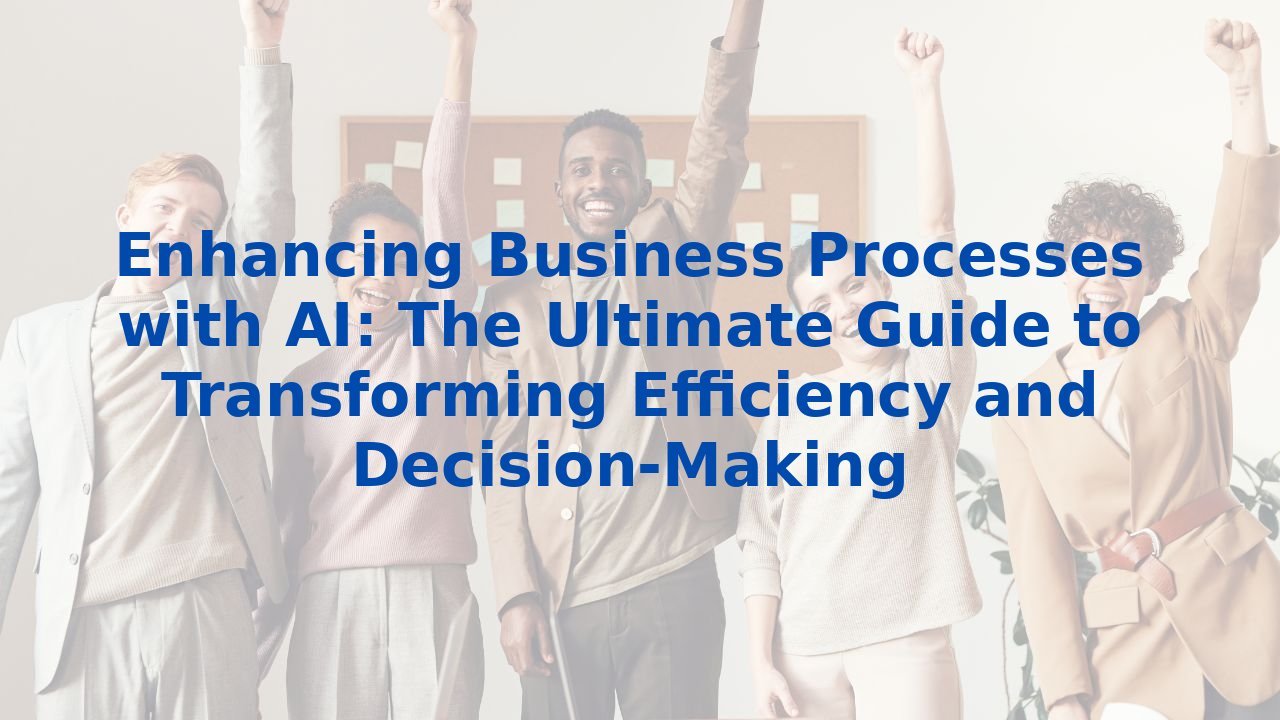Enhancing Business Processes with AI: The Ultimate Guide to Transforming Efficiency and Decision-Making
Enhancing Business Processes with Artificial Intelligence
In the whirlwind of today’s business landscape, companies are on a relentless quest for optimization, striving to trim costs while maximizing efficiency and decision-making prowess. Enter Artificial Intelligence (AI)—a transformative force redefining operational efficiency across industries. Implementing AI not only streamlines workflows but also empowers organizations to make informed decisions, capturing insights like never before. In this guide, we will delve into how AI enhances various business processes while highlighting the compelling advantages it brings to the table.
1. Improving Meetings
Meetings can often become a labyrinth of administrative tasks, consuming valuable time and resources. This is where AI steps in, automating mundane tasks like scheduling and note-taking. Imagine voice assistants meticulously organizing your calendar and AI-driven tools generating concise summaries of discussions. Such enhancements not only save time but ensure critical details don’t get lost in the shuffle, allowing teams to focus on what truly matters—innovation and collaboration.
2. Enhancing Sales and Marketing
The sales and marketing arenas are fertile grounds for AI applications. AI-infused analytics provide invaluable insights, allowing organizations to identify high-potential customers and predict revenue flows. By harnessing these insights, sales teams can channel their energies into areas that promise the highest returns. Moreover, the utilization of chatbots offers not only improved customer engagement but also contributes significantly to revenue generation. The outcome is a data-driven approach that augments profitability while optimizing marketing strategies.
3. Assessing and Improving Customer Service
Customer service defines the heartbeat of any organization. AI plays a crucial role in amplifying service quality through automated assessments. By parsing through interactions with advanced voice recognition, AI can highlight areas needing improvement, ensuring customer interactions uphold high standards. The result? Enhanced satisfaction that deepens customer loyalty and trust, foundational elements in a competitive landscape.
4. Improving Product Development Processes
Product development can resemble navigating a convoluted maze, fraught with trials and errors. AI revolutionizes this process through generative design software. By inputting specific design criteria, businesses can explore myriad possibilities in record time, saving both effort and resources. Instead of traversing the conventional route of multiple prototypes, organizations can allocate those savings to other critical areas, enhancing overall productivity and creativity in development.
5. Automating Content Generation
Content is the lifeblood of contemporary marketing and communication. AI facilitates swift content generation, whether it’s dynamic product descriptions or in-depth reports. With AI’s capability to produce vast amounts of text in mere moments, content creation teams can channel their creativity where it matters most—crafting strategies instead of laboring over basic copywriting. This efficiency not only enriches productivity but also elevates the quality of engagement.
6. Enhancing HR Processes
The realm of Human Resources is often inundated with applicants and data management tasks. With AI, HR departments can automate initial screenings and assessments, substantially easing the burden on recruiters. By leveraging AI recruitment platforms, organizations minimize bias and enhance the hiring process, fostering a more inclusive and efficient recruitment strategy.
The Role of AI in Business Process Management
AI's transformative impact on Business Process Management (BPM) cannot be overstated. By embracing AI, companies can unlock numerous benefits:
- Process Discovery: AI utilizes process mining techniques to identify existing inefficiencies.
- Process Mapping: Real-time data allows for accurate and current mapping of workflows.
- Process Automation: Companies can deploy AI bots to handle repetitious tasks with precision.
- Process Management: Continuous monitoring ensures stakeholders remain informed about potential issues.
- Process Improvement: Data-driven insights foster sustainable enhancements within workflows.
Benefits of AI for Business Efficiency
What are the real outcomes of embedding AI into business processes?
- Faster Data Analysis: AI's rapid data processing enables informed strategic decisions.
- Automating Routine Tasks: By handling repetitive tasks, AI frees teams to focus on strategic initiatives.
- Enhanced Decision Making: Data-driven insights enable proactive and informed decision-making.
- Real-Time Monitoring: Organizations can swiftly react to opportunities or challenges as they evolve.
- Predictive Analytics: Historical data insights foster foresight, minimizing delays and optimizing outcomes.
Training Employees for AI
While AI spans vast potentials, unleashing its full capability hinges on effective employee training. Bringing your teams up to speed not only encourages collaboration with AI but also empowers them in navigating complexities with confidence.
- Improved Collaboration: Familiarity with AI fosters integration among workflows.
- Enhanced Problem-Solving Skills: Training equips teams to extract actionable insights easily.
- Adaptability: Knowledgeable employees remain agile, comfortably embracing new technologies.
Conclusion
In closing, the integration of AI into business processes heralds a new era of operational excellence. By embracing AI’s capabilities—ranging from automation to data analysis—organizations can enhance efficiency significantly while laying the groundwork for sustained growth. Coupled with a commitment to employee training, the promise of AI transcends mere technology, evolving into a cornerstone of future-ready businesses.



